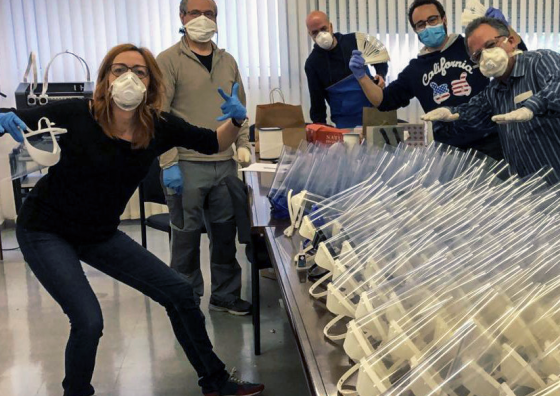The Technological Unit of the Institute of Cosmos Sciences is one of the research groups that has joined the initiative of the Fab-Lab UB of the University of Barcelona, where researchers from the Faculties of Physics, Chemistry, Medicine and Fine Arts also participate.
The Fab-Lab UB group was organized during the month of March, when the authorities and the professionals of the sanitary facilities warned of the need to increase the stock of protective material for health technicians and professionals. The University of Barcelona, searched for those departments and research groups that had 3D printers, and organized working groups to produce and distribute material among the health centres that requested it. So far, the Fab-Lab UB has manufactured more than 695 protective screens, 98 door openers and 1270 ear protection units.
ICCUB researchers joined the initiative by providing the 3D printer, which has been available to healthcare needs since March 30. The printer is normally located at the Institute's facilities in the Barcelona Science Park, in the prototype laboratory, where it is used for research-related tasks. The engineers and researchers of the Technology Unit routinely use the printer to design and manufacture prototypes and parts for fastening electronic systems. These electronic systems, which are also designed by the team, are usually different types of sensors that must be fixed with mechanical fasteners, or crystals that must be attached to the sensors themselves, among others. 3D printing allows them to obtain the parts quickly, and to make the necessary modifications in a short period of time, at a reasonable price. Another advantage of this type of printing is that, in case it’s necessary to manufacture the same part in a different material, engineers can send the already validated prototypes directly to the manufacturers or suppliers. This system can also be used for other projects, as in the case of the dissemination workshop "Quarks: the bricks of matter", where the pieces were obtained by 3D printing.
The engineer Andreu Sanuy, who coordinates the 3D printing service within the Technology Unit, tells us: "We have a mailing list where the needs for sanitary material are constantly updated; we share the files between the various groups, in order to manufacture the pieces in the most optimal way, and then we organize ourselves to collect all the pieces, assemble them and distribute them". Various meetings have already been organized by the Faculty of Physics, in order to assemble the parts and manufacture the protective screens. The distribution of materials is carried out based on the needs of those health centres and hospitals that request it.
